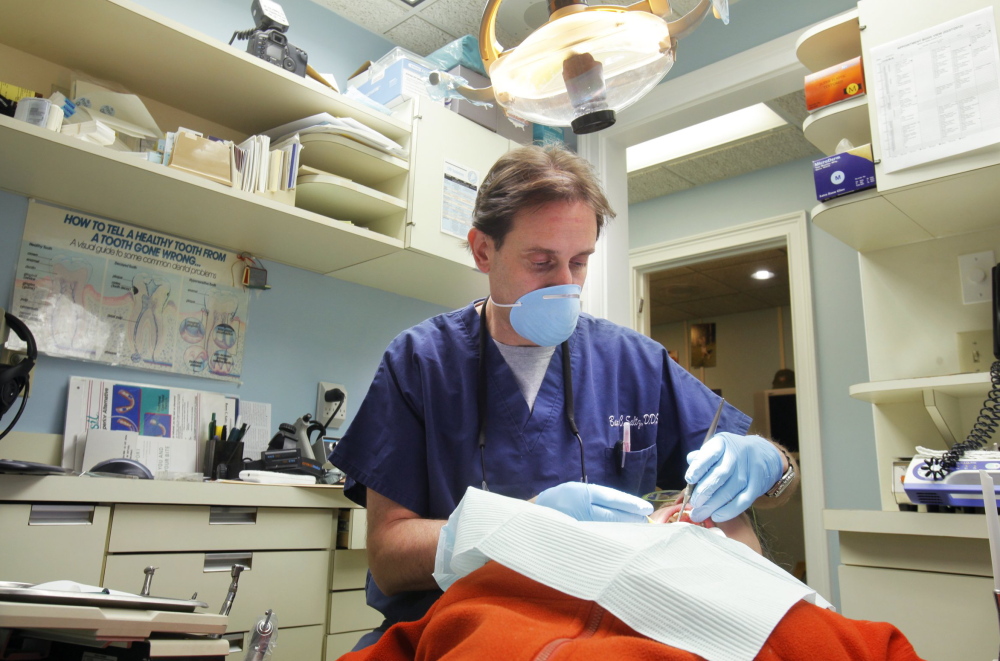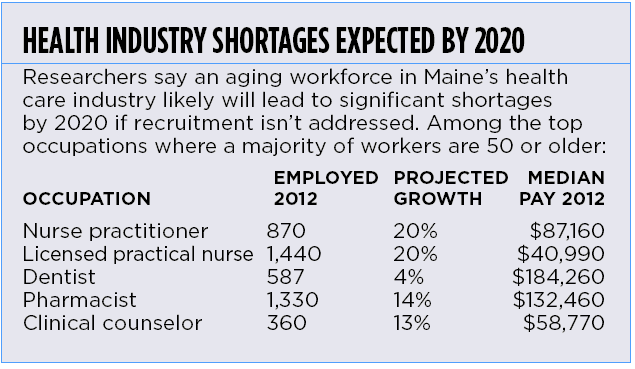Maine is likely to suffer a shortage of medical professionals in the coming years unless the industry boosts student enrollment at health care-related schools in the state and recruits more workers from outside Maine, according to a report issued this week.
The workforce development problem will be especially dire in the fields of dentistry and psychology, in which two-thirds of all current practitioners in the state are older than 50 years old, said the report, by the Maine Department of Labor’s Center for Workforce Research and Information.
Occupations for which nearly half of the existing practitioners are older than 50 include pharmacists, nurse practitioners and licensed practical nurses, it said.
Overall, the need to replace currently practicing health care professionals is expected to outstrip the need to expand Maine’s medical workforce because of population growth, the report said.
As a result, the future job market in Maine will favor those seeking employment in a variety of health care specialties, it said, but hospitals and medical clinics are expected to face difficulties maintaining a full staff.
Paul Bolin, Eastern Maine Healthcare Systems vice president of human resources, east region, understands the problem well. He said experienced nurses, certified medical assistants and pharmacists with residency experience have been the most difficult employees to find.
Since the recent economic downturn, it has been harder to recruit such workers away from their existing jobs, he said, although the upside is that employee retention at EMHS has improved.
For difficult-to-fill jobs, EMHS recruits both locally and nationally, said Bolin, who is also co-chair of the Maine Health Workforce Forum, a group created by the Legislature in 2005 to address workforce challenges in the health care field. He said the Department of Labor study will help hiring managers identify workforce trends in Maine’s health care industry and direct their efforts both in terms of hiring and education.
NURSES AT THE HELM
In response to the strong demand for workers, the number of Maine graduates in various health care fields has increased by 33 percent from 2007 to 2011, although recipients of bachelor’s and graduate degrees increased by only 12 percent, according to the report. The rise in graduates from post-secondary health care programs during that period consisted primarily of those receiving associate’s degrees and technical certifications.
The slow growth among graduates receiving at least a four-year medical degree was primarily the result of limited growth in nursing programs, the report cited, a situation exacerbated by a shortage of qualified professors.
The nursing field is expected to see the most dramatic growth over the next several years. Employment of registered nurses in the state increased by 29 percent from 2000 to 2010 and is projected to increase by another 20 percent from 2010 to 2020, said the report. Demand for nurses is fueled by technological advances, greater emphasis on preventative care and the expanding role of nurses in health care delivery.
Unfortunately, graduation rates for nursing students in Maine have not kept pace with demand, especially for graduates with bachelor of science in nursing degrees, for which the greatest demand exists.
“A limited pool of doctoral-prepared teaching faculty and steep competition for these professionals from higher paying industry employers has been a barrier to capacity growth,” the report said.
Another challenge will be to maintain an adequate number of medical doctors in the state. One program that seeks to address the issue is a partnership among Tufts University School of Medicine in Boston, Maine Medical Center in Portland and Maine colleges and universities, said University of Maine spokeswoman Margaret Nagle.
Under the Maine Track Program, pre-med students in Maine compete for fast-tracked enrollment at Tufts University’s medical school. However, the students are under no obligation to return to Maine to practice medicine after they graduate.
The program was designed to help compensate for Maine’s lack of medical training for aspiring physicians, psychiatrists and surgeons. Maine does not have a designated school for MDs, although it has schools for nurses, pharmacists, osteopathic physicians and other medical specialties.
In the five years since it was created, 12 pre-med students from UMaine have been accepted into the program, said Cris Anne Blackie, UMaine’s health and legal professions career specialist.
Overall, it is difficult to track how many UMaine students go to medical school, not to mention how many return to Maine to practice medicine, Blackie said. Still, the number of students declaring an interest in pre-med at UMaine has increased each year for the past five years, she said.
The report also cited special challenges for rual communities, where 41 percent of Mainers live. Because rural areas have a lower average income, higher rates of poverty and unemployment and lower levels of educational attainment, recruiting and retaining health care providers in those regions is more difficult than in more urban areas.
Driving Maine’s increasing need for medical care professionals is its aging population. According to the report, the greatest demand for workers catering to the elderly will be among home-health and personal-care practitioners, who can be difficult to recruit and retain because of those jobs’ low pay and high emotional and physical demands, it said.
J. Craig Anderson can be contacted at 791-6390 or at:
Twitter: jcraiganderson
Copy the Story Link
Send questions/comments to the editors.





Success. Please wait for the page to reload. If the page does not reload within 5 seconds, please refresh the page.
Enter your email and password to access comments.
Hi, to comment on stories you must . This profile is in addition to your subscription and website login.
Already have a commenting profile? .
Invalid username/password.
Please check your email to confirm and complete your registration.
Only subscribers are eligible to post comments. Please subscribe or login first for digital access. Here’s why.
Use the form below to reset your password. When you've submitted your account email, we will send an email with a reset code.